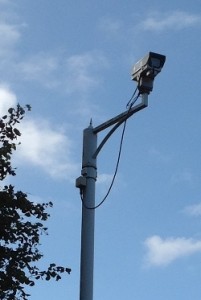Surveillance enables complex societies to function. This is not the world of Bentham’s ‘Panopticon’ but of dataveillance; dispersed and rhizomatic systems of assemblage of information. Boundaries are fluid yet heavily policed. Data-doubles are sorted into categories by which behaviour is orchestrated. To a greater or lesser extent, all members of advanced capitalist societies are beneficiaries, objects and practitioners of ubiquitous surveillance.
 I position my project under the umbrella of surveillance studies; an interdisciplinary clustering of academics from sociology, criminology, philosophy, geography, urban studies, information technology, law, human rights, agriculture and healthcare (with apologies to any disciplines I have neglected). As a theologian my contribution is particularistic – in the sense that I do not adopt a distanced stance as would a colleague from the field of religious studies. I make no pretence to know or understand how religious traditions other than Christianity frame the world. Nor am I particularly interested in the contribution of ‘religion’ per se to debates over surveillance. My critique is from the Christian theological traditions which are themselves impregnated with discourses of surveillance from on high and laterally by the Church.
I position my project under the umbrella of surveillance studies; an interdisciplinary clustering of academics from sociology, criminology, philosophy, geography, urban studies, information technology, law, human rights, agriculture and healthcare (with apologies to any disciplines I have neglected). As a theologian my contribution is particularistic – in the sense that I do not adopt a distanced stance as would a colleague from the field of religious studies. I make no pretence to know or understand how religious traditions other than Christianity frame the world. Nor am I particularly interested in the contribution of ‘religion’ per se to debates over surveillance. My critique is from the Christian theological traditions which are themselves impregnated with discourses of surveillance from on high and laterally by the Church.
In many senses I am doing theology in public as well as for the public. This means that my contribution to the interdisciplinary field of surveillance studies lies broadly within the field of ethics. Michael Walzer’s iterative method of social criticism underpins my approach; his notion of sharing particularistic insights and hearing those from other perspectives engages us all in a continual spiral of re-evaluation. Whilst a historian of Christian thought might proffer accounts of the interaction over centuries between confessional, philosophical and political ideas around surveillance, my own approach articulates how my community of faith engages (and might better engage) with a surveillance culture with a view to cross-fertilization and mutual support arising from others’ meaning-making institutions, social systems and traditions (whether these be religious or not).
A consequence of this method is my interest in how religious groups are both under surveillance but, as significantly, practice surveillance. This dimension of my unfolding project is incumbent upon anyone who wishes to contribute from particularistic stance – hearing from, not merely speaking to, other disciplines demands community-reflexivity.